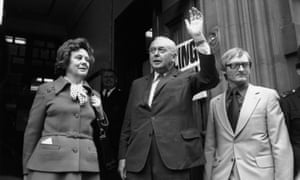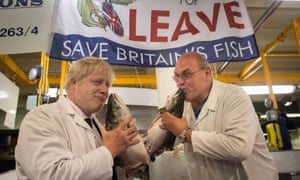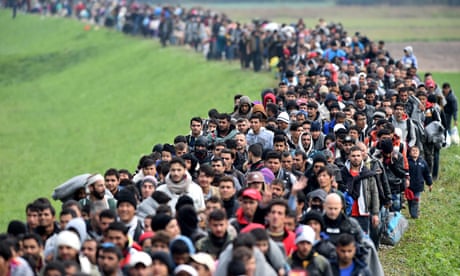In or out, Cameron's EU referendum may leave a toxic legacy
 Michael White
Michael WhiteThe history of the political device loved by populists is not a happy one. In Scotland, it has created divisions and one-party rule
 PM David Cameron on a campaign bus in Bristol. Photograph: WPA/Getty Images
PM David Cameron on a campaign bus in Bristol. Photograph: WPA/Getty ImagesWednesday 22 June 2016 14.53 BSTLast modified on Wednesday 22 June 201615.23 BST
Share on LinkedIn
Share on Google+
Shares
236
Comments1,059
Save for later
Why is it that a referendum campaign feels so different from the mood of a general election: more impassioned, more in your face, more bitterly divisive?
I felt uneasily the same covering Scotland’s 2014 campaign on independence from England, less so 41 years ago during Britain’s first Brexit ballot in 1975 over its barely dry membership of what we all called the Common Market.
Yet the parallels are eerily striking. A prime minister, then Labour’s Harold Wilson, now Tory David Cameron, used a contentious device, abused by dictators in the 30s, to try to heal a divided party and do so after a pretty bogus “renegotiation” of British terms. Wilson won and was gone from No 10 within a year. What will be the less nimble Cameron’s fate?
Analysis Ruth Davidson enjoys her Nicola Sturgeon moment in EU debate
A stellar TV performance gave viewers across the UK a glimpse of how the Scottish Tories have achieved a striking resurgence
Read more
Any answer to 2016’s “why different?” needs to separate out two distinct strands. One is the differing functions of an election – to choose a government for five years – and a referendum – to decide a single issue, possibly forever. The other is the very changed circumstances in which Britain now lives, both better and in some ways worse than in 1975.
Even that doesn’t quite cover the variables, does it? Many voters have probably already forgotten that Britain had a referendum as recently as five years ago – Nick Clegg’s doomed attempt to “reform” Westminster’s first-past-the-post voting system with a controversial version of proportional representation (PR) known as the alternative vote (AV). The wishy-washy compromise, nominally supported by Ed Miliband’s Labour opposition, was defeated by a thumping 2 to 1 on a miserable 42% turnout, and soon forgotten.
Given the political battles that were to come – the 1979 and particularly 1983 elections – why was 1975 relatively benign? Because tectonic plates of economic globalisation were only starting to shift under the old Britain. Nor had Thatcherism’s “free market liberation” message, proclaimed via the raucous Sun, yet replaced old-fashioned deference and the class solidarity of the factory with what one Labour MP would later call “shell suits and rottweiler” individualism.

FacebookTwitterPinterest PM Harold Wilson at the referendum polling station in London, June 1975. Photograph: Keystone/Getty Images
Social media? That was what people did over the garden wall. 24/7 TV? Only three channels in 1975, colour was still a novelty and the then PM, Ted Heath, had forced them all to go off air at 10.30pm during the three-day week to save striking miners’ coal stocks. Stoical wartime Britain accepted it, as 2016’s Twitter Britain would not.
In 1975 most of Labour and the unions were still in a “socialism in one country” mentality. The TUC giant Jack Jones railed against Europe as full of Catholics; Peter Shore, a strong pro-Commonwealth minister, invoked “British farms in Canada” and Kiwi butter. Tony Benn, still predicting a win on polling day, was in hock to the siege economy crowd whose cause has failed so often since.
Against them were almost all the newspapers, plus the new Tory leader, Margaret Thatcher (and her defeated rival, Ted Heath), most of Wilson’s cabinet, plus the SDP-to-be Gang of Four – Roy Jenkins and co – for all of whom Europe was the key to modernisation. They rolled over the Brexiteers.

Exclusive: Nato chief says UK staying in the EU is key to fighting terrorism
Read more
Perhaps that’s why Cameron’s cursory look at the history books (the Cameroons treat strategy as if it was an overdue essay for an Oxford tutor, someone quipped) gave him the impression he could easily concede an indy referendum to the SNP and win a binary in/out question with no “devolution max” third option.
Fired up with passion and a belief that independence could solve Scotland’s problems at little or no cost to voters (“Do you want to belong to one of the richest countries in the world?”), the yes campaign gave a complacent Downing Street the fright of Dave’s young life and got within a few per cent of victory in 2014.
All this despite a falling world oil price shredding SNP maths in the background. Yet, as with the Brexit debate, some nationalists feel so strongly about “sovereignty” that they would “rather be poor and free than rich and enslaved”, as the leave EU columnist Melanie Phillips wrote in hyperbolic terms this week. But the real price was deepening divisions in Scotland and creating a scary degree of one-party dominance and intolerance. It is widely denied, but also evident.
Win or lose, will that be the toxic legacy for the rest of Britain after Thursday’s verdict is known? Short of a decisive win for one side or the other – polls suggest a tight finish – it seems likely. Things have been said on both sides that may be forgiven, but not forgotten.

FacebookTwitterPinterest Boris Johnson (left) campaigns at Billingsgate fish market in London. Photograph: Stefan Rousseau/PA
Can Cameron’s intended reconciliation cabinet reshuffle really put Michael Gove and Boris “Trump” Johnson around the coffin-shaped table as if nothing has happened? Even that assumes he will scrape home on Friday morning, as most smart money – and the crafty bookies – still expect.
Advertisement
Defeated, he will start to look like the careless, over-confident leader who took a gamble and lost both Europe and Scotland, the most disastrous British prime minister since Lord North lost George III’s American colonies in 1783. So he may face an early challenge for the Tory leadership.
But by whom? Cameron has always been luckier than he deserves, not least in enemies like shifty Boris Johnson and feeble Jeremy Corbyn, whose ambiguous support for remain (his heart remains with Tony Benn and Hugo Chavez) is unlikely to bring him electoral reward. Corbyn’s barely visible campaign does not deserve it. Even Labour voters think the referendum a blue-on-blue affair, Eton v Eton.
Playing the immigration card to drive the Brexit campaign forward, Leave.EU is Brexit’s provisional wing. In victory or defeat, its Ukip faction may be better placed to harvest disaffected working-class votes in the future than vegetarian and bearded Islington pacifism.
Yet Cameron is lucky too in Nigel Farage, an arsenic and Marmite politician who fails to win elections except the EU way. It’s personal, Nigel.

Jeff Mitchell's best photograph: ‘These people have been betrayed by Ukip’
Read more
Donald Trump has shown that a more talented demagogue with even fewer scruples could do serious damage to Britain’s famously adaptable political system in times of such uncertainty, but only if he or she first captures a major party as Trump has (for the moment) done. Who first called Johnson “Britain’s Berlusconi”? He is the only visibly charismatic talent, the political equivalent of disruptive technology, Boris the Uber app.
Sem comentários:
Enviar um comentário